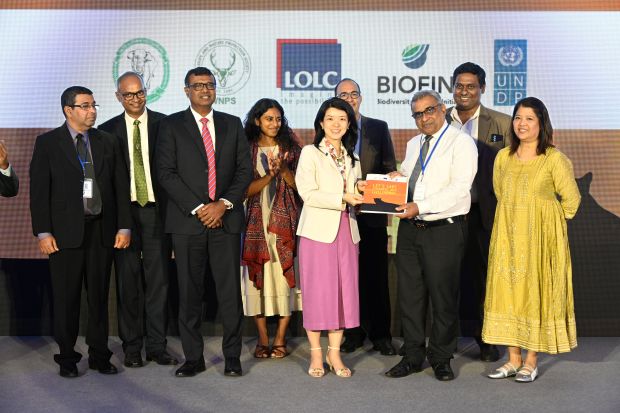Sri Lanka launches first-ever livestock insurance scheme to protect leopards and farmers
COLOMBO – A groundbreaking Livestock Insurance Scheme was launched on Tuesday (19) to mitigate human–wildlife conflict and protect the endangered Sri Lankan Leopard (Panthera pardus kotiya), the Sri Lanka’s apex predator.
The initiative, the first of its kind in the country, was introduced by the United Nations Development Program (UNDP) in Sri Lanka through its Biodiversity Finance Initiative (BIOFIN), in partnership with the Wildlife and Nature Protection Society (WNPS), LOLC, and the Department of Wildlife Conservation (DWC).
The scheme provides rapid monetary compensation to farmers who lose livestock to leopard attacks, aiming to reduce retaliatory killings of the species while safeguarding rural livelihoods.
“This program offers a practical and timely solution to a long-standing challenge in leopard conservation,” said Ranjan Marasinghe, Director General of the Department of Wildlife Conservation, noting that by ensuring affected farmers are compensated swiftly and fairly, the risk of retaliatory actions can be reduced and trust built between communities and conservation authorities.
The Sri Lankan Leopard, a keystone species that regulates herbivore populations and maintains ecological balance, is increasingly threatened by habitat loss, poaching, and prey depletion. Leopards moving into human-dominated areas often prey on livestock, leading to significant financial losses for farmers and, in many cases, revenge killings of the animals.
Baseline surveys conducted under the LOLC–WNPS Multi-Regional Leopard Research and Conservation Project, which operates six research centres across the island, revealed frequent cases of livestock predation in buffer zones of protected areas. Many of these incidents led to unreported retaliatory killings, underscoring the urgency of intervention.
Under the new insurance scheme, UNDP will cover the premium costs, while LOLC Insurance acts as the provider. Farmers reporting livestock losses can file claims through designated WNPS officers. Verification will be carried out by DWC, veterinary, and Grama Niladhari officials, with compensation paid directly to farmers—typically within 72 hours.
Kithsiri Gunawardena, Chairman of LOLC Insurance, noted: “This pioneering initiative reflects our long-term commitment to safeguarding biodiversity while supporting rural livelihoods. By working together, we can create sustainable solutions where both communities and wildlife can thrive.”
The program also promotes long-term preventative measures, including predator-proof enclosures, shared communal livestock pens, and an innovative ‘Cattle Bank’ system that provides replacement animals instead of cash payouts.
Azusa Kubota, Resident Representative of UNDP Sri Lanka, said the initiative goes beyond financial aid: “We are embedding this scheme into national policy frameworks while strengthening communication with farmers and conservation staff. This approach ensures that solutions are not just reactive, but sustainable and aligned with global biodiversity and sustainable development goals.”
Graham Marshall, President of WNPS, highlighted the broader vision: “Lasting conservation depends on long-term solutions that benefit both people and wildlife. This programme is one such initiative—practical, science-based, and rooted in trust with communities.”
Echoing this, Spencer Manuelpillai, WNPS project lead, added: “This program transforms research into real-world action. Instead of only documenting conflict, we are addressing it head-on through a pioneering mechanism that protects both livelihoods and leopards.”
The Sri Lankan Leopard is not only critical to ecological balance but also a major draw for the country’s tourism industry. Protecting it requires a delicate balance between conservation and community needs.
This new livestock insurance scheme represents a holistic step in that direction, recognising that “conservation is a two-way path—people need leopards to sustain ecosystems, and leopards need people to ensure their survival.”
-ENCL



Comments are closed, but trackbacks and pingbacks are open.